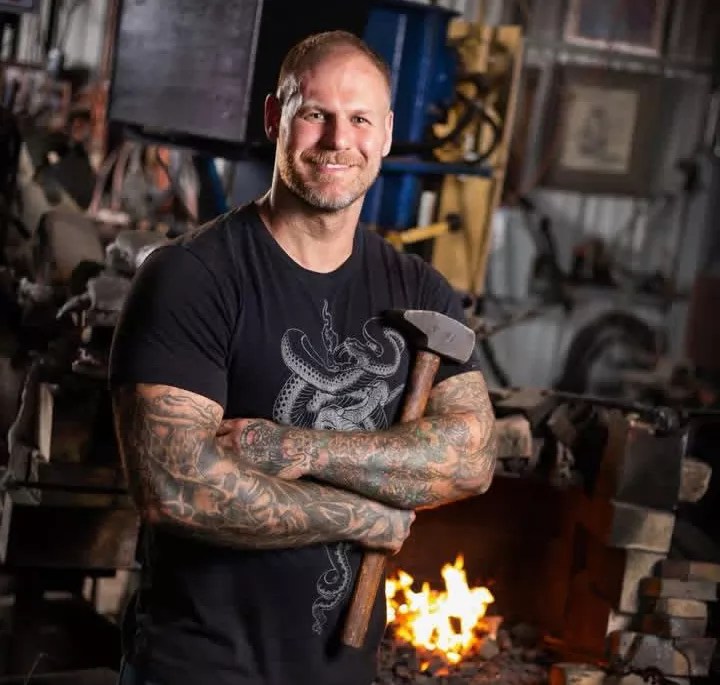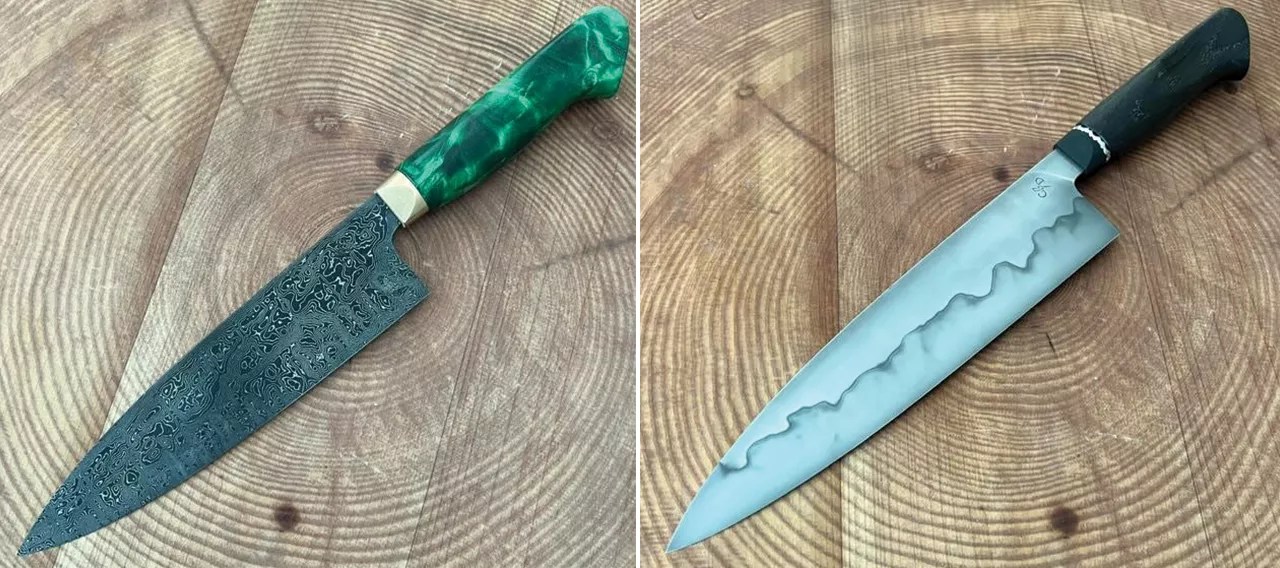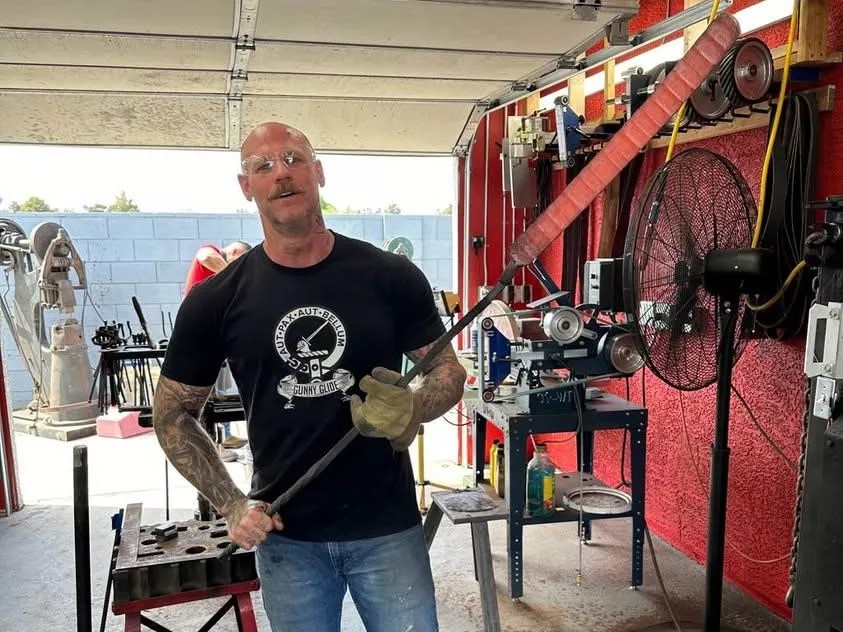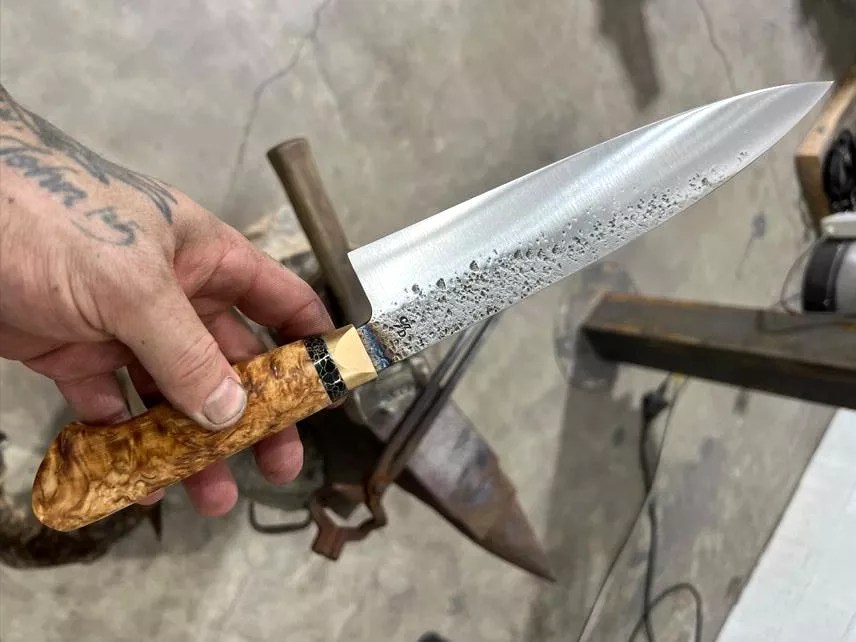
Courtesy of Corey Dunlap

Audio By Carbonatix
On Smith Road, just a couple of blocks from the bustling Tempe Marketplace, sits a quiet industrial park. Behind the roll-up garage doors, there are various businesses, one of which is Corey Dunlap Custom Knives & Sharpening. The exterior of the space is very unassuming. Enter, however, and impressive machinery used to forge steel as well as work benches and various hand tools come into view.
Working in the back is Dunlap. Tattoo-clad, wearing boots and safety glasses, he forges steel at more than 2,100 degrees Fahrenheit. Some of the most beautiful, custom Damascus steel knives are made here.
Damascus steel, comprised of thousands of layers of high carbon steel alloy compressed together, is prized for its ability to hold a severely sharp edge and for its beautiful wavy pattern.
Before he fell in love with knife-making and sharpening, Dunlap was a chef in the Valley for nearly a decade. First completing his education at the Arizona Culinary Institute, Dunlap started working at Different Pointe of View at the Pointe Hilton Tapatio Cliffs Resort and then went on to other notable resorts and restaurants in the state, including L’Auberge in Sedona and St. Francis in Phoenix.
Dunlap eventually wanted a change from the kitchen.
“From cooking, I just got burnt out, and I was obsessed with knives and sharpening, so I started sharpening knives professionally,” he says.
For more than a decade, Dunlap sold imported Japanese knives at a local cutlery and kitchen tools shop. That experience piqued his interest in learning to make knives, “more so to understand knives and the sharpening process, pre-finishing and things like that,” he says.
He soon met Master Bladesmith Ray Rybar from The American Bladesmith Society and his forging education truly began.

Corey Dunlap creates knives out of Damascus steel, a material prized for its ability to hold a severely sharp edge and for its beautiful wavy pattern.
Courtesy of Corey Dunlap
Being a former chef, Dunlap knows how to create blades that will serve their user well.
“It does greatly help that I know how a knife is supposed to be used and how a knife should function,” he says. “So when it comes to the final shaping of my knives and why I make them the thickness I do, or the shape I do, it’s because through my experience, I’ve decided this is what works best.”
Dunlap’s knowledge of Japanese knives inspires the shape and geometry of his blades. Just as in cooking, Dunlap enjoys the meticulous nature of knife-making.
“I enjoy that I can get lost in my work. I’m not a perfectionist, but I enjoy the fine details. It’s an artistic outlet, it is physical work which I don’t mind and I actually like, but more than that, you get to be creative,” he says. “With the Damascus, it’s a never-ending rabbit hole.”
Dunlap could use the same materials and steps to create two knives, but the patterns on the blades will always differ.
“I’ll never be able to learn enough about knife-making. So I just don’t ever get bored of it,” he says.

Bladesmith Corey Dunlap makes both forged and stock removal knives.
Courtesy of Corey Dunlap
There are two general methods for making knives. For forged blades, the metal is heated to extremely high temperatures and then shaped with a press, or forge. The other method is stock removal blades, where the shape of a knife is cut out of a block of steel, after which it is further ground to the correct shape.
In both methods, the blade is heat-treated to harden the steel, and then a tempering process is completed so the blades are not too brittle. Dunlap says that heat-treating is one of the most important steps of knife-making.
“When it comes to heat treatment, you can get very different hardnesses if you’re off by just 25 to 50 degrees. So, usually, we’re using some sort of control method for that,” he says.
Once the blade is heat-treated and tempered, it is ground and sanded further. Handles and hardware are installed, and lastly, the blade is sharpened.
Dunlap creates both forged and stock removal knives. He sells directly to consumers out of his shop in Tempe, as well as via several retailers out of state. However, customers will soon be able to pick up his stainless steel chef’s knife at Sharpe Haus in Scottsdale.
All of Dunlap’s forged knives are high carbon, with no stain-resistant properties. This means they require slightly more maintenance than stainless and will patina.
“It’s natural, it’s part of the way that steel is,” he says.

At an unassuming workshop in Tempe, Corey Dunlap forges steel at over 2,100 degrees Fahrenheit.
Melissa Pickering
Though other Damascus knives can be readily found at many retailers, they are not all created equal.
“The first thing about Damascus is, if you ever see a Damascus knife and the price seems just really reasonable, then it’s probably not high-quality,” Dunlap says. It might have a very beautiful pattern, but if it’s under $100, it’s probably not made with knife-grade steel.
“It’s probably just a couple different steel materials, pretty mild in carbon content, so they’re not actually going to get that sharp or stay sharp. So that’s number one. If you’re looking at Damascus knives where the Damascus was made by a craftsman, you can expect about $200 per inch for the cost of the knife. So an eight-inch knife is probably around $1,600.”
Outside of price, Dunlap explains that mass-produced knives are made to suit general needs.
“You’re erring on the side of the caution because these are gonna go into anybody’s hands. So you may grind your knives a little bit thicker than a handmade knife-maker would. And the reason for that is it’s going to be more durable, it’s gonna be less susceptible to damage or chipping at the cutting edge,” he says.
For most home cooks, this is a good thing. But for professional chefs, it’s more desirable to have a thinner blade sharpened to a more severe angle, which creates the best cutting edge. The harder the steel, the more delicate the cutting edges are.
“In order for a knife to stay sharp for a long time, you need a really hard steel. After that, in order for your knife to cut really well, you have to grind it really, really thin,’ the craftsman says. “The thinner your knife is, the easier it’s going to go through foods and the better it’s going to slice.”
A quality knife-maker is able to tailor a knife to its user. For instance, for a less experienced cook with less developed knife skills, Dunlap would create a more durable knife.
“I would still grind it thin, but I would maybe make it a tougher knife for them so it didn’t get damaged,” he says.

Corey Dunlap’s knives, from the blade to handle, can be customized for their user.
Courtesy of Corey Dunlap
In addition to chef’s knives, Dunlap makes a variety of small fixed-blade knives akin to utility knives.
He also offers one-on-one knife sharpening lessons, which can be booked via his website. Students are given a water stone to practice on and keep, and the lessons last about three hours.
Dunlap is a member of The American Bladesmith Society and one day plans on becoming a certified Master Bladesmith, of which there are just over 100 worldwide.
Looking ahead, Dunlap says he would love to spend more time traveling and teaching at various workshops. But he doesn’t ever plan on retiring from the knife business.
“I don’t want to ever not be in it,” he says. “It’s what I know and love.”
Corey Dunlap Custom Knives & Sharpening
625 S. Smith Road, #28, Tempe